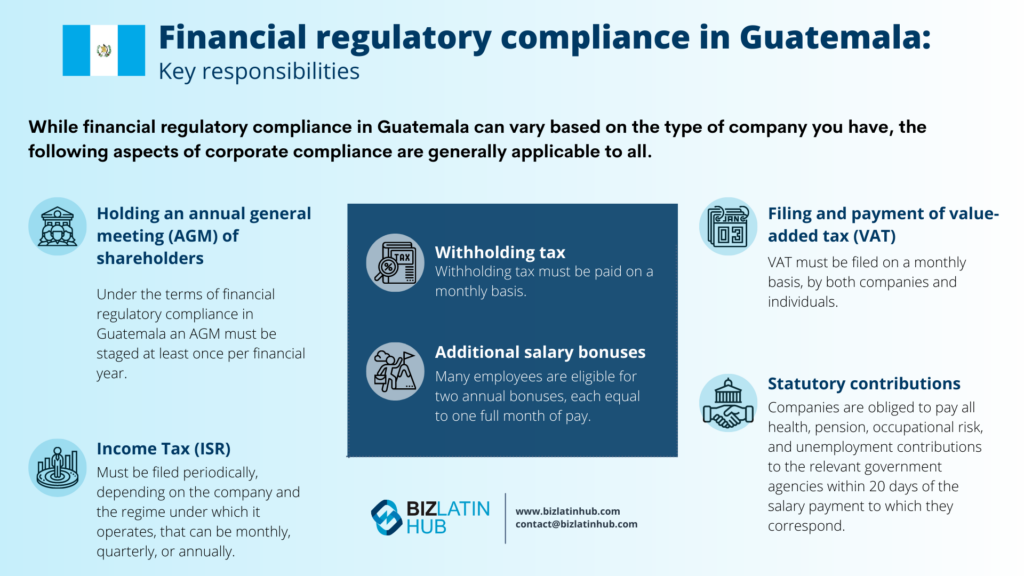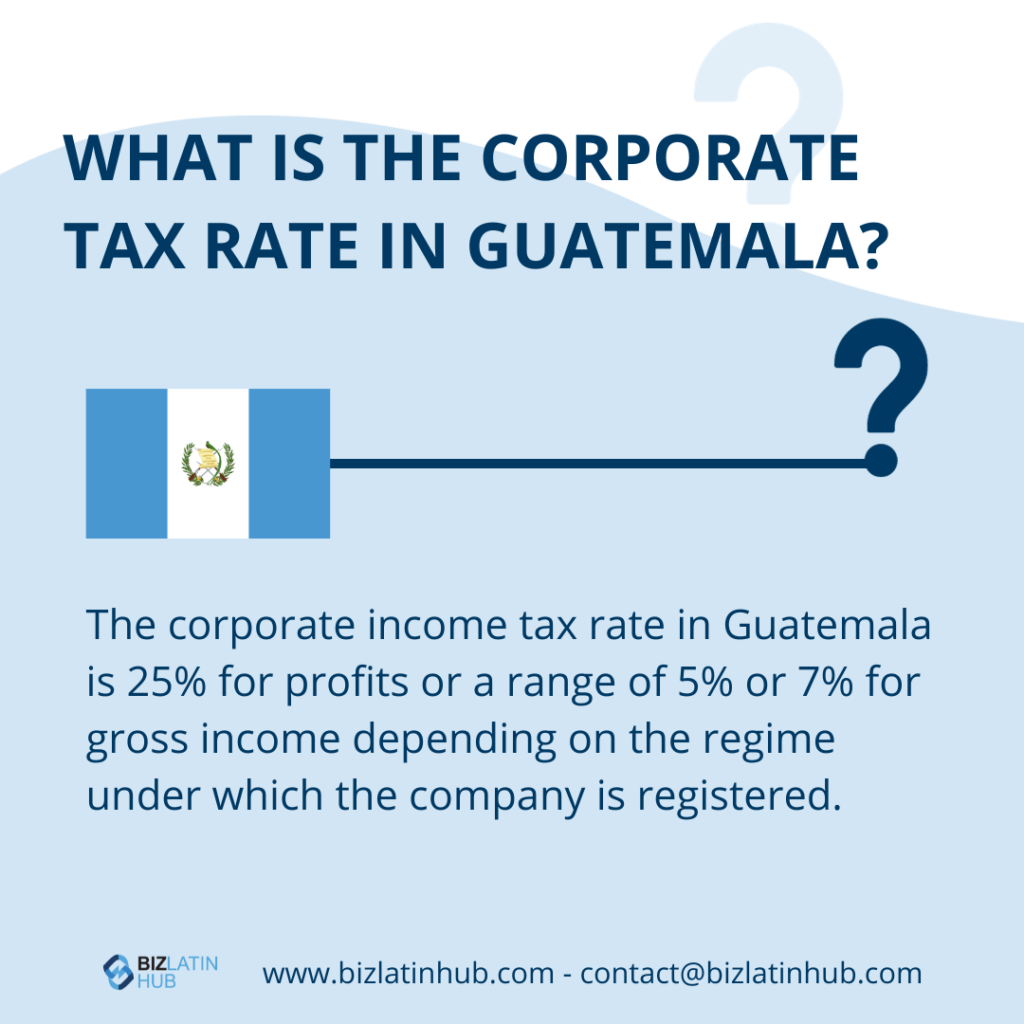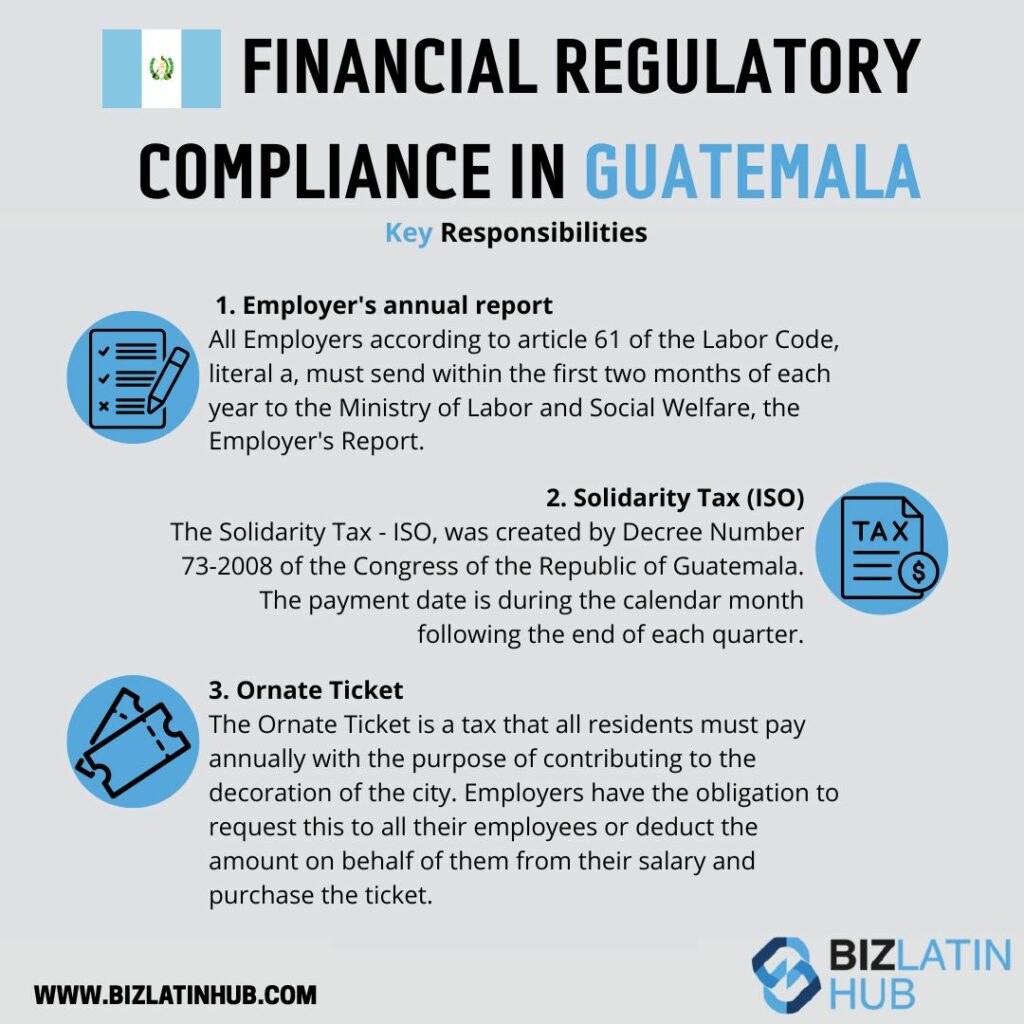Guatemala welcomes foreign investors with exciting opportunities in farming, renewable energy, and manufacturing. Its strategic location, affordable labor, and dedication to economic improvements make it an attractive destination for those looking to enter the growing Central American market.
To support your company incorporation and ongoing operations, you must be aware of and comply with the following accounting and tax requirements in Guatemala.

Table of Contents
What are the accounting regulations in Guatemala?
As of January 2009, Guatemala has embraced the International Financial Reporting Standards (IFRS) for accounting. Although the initial adoption period required local professionals to undergo extensive training, these standards are now mandatorily and widely applied across the country. IFRS provides a comprehensive set of guidelines that cover a broad spectrum of business aspects, including industry-specific regulations, operating risks, and other pertinent factors.
It’s crucial for businesses looking to invest in Guatemala to identify and understand the IFRS rules relevant to their specific sector. This understanding is vital when preparing financial statements. This task should be a collaborative effort involving the accounting or finance team and key stakeholders, such as investors or senior executives in expanding companies.

What are the business taxes in Guatemala?
For those considering entering or expanding within the Guatemalan market, it’s essential to familiarize oneself with the country’s distinctive tax framework. The Guatemala Tax Administration (SAT – Superintendencia de Administración Tributaria) oversees the collection of taxes from individuals and companies nationwide.
In Guatemala, businesses must report direct and indirect taxes to the SAT. The most notable taxes include the value-added tax (VAT) and income tax, which are filed every month. Understanding and complying with these tax obligations is essential for any business operating in Guatemala.
Income tax
Income tax in Guatemala applies to the profits earned by individuals and companies, whether domestic or foreign, regardless of residency status. This tax is governed by Decree 10-2012 and is applicable whenever there is taxable income. It encompasses a wide range of income sources, making it a key component of the country’s tax system.
Value added tax (VAT)
The tax that generates the most money for the State. It is paid by every person who buys a good or acquires a service. Decree 27-92 regulates this tax. The VAT rate is 12% of the value of each product or service and is always included in the prices of everything bought in Guatemala. Taxpayers registered in the General Regime must report monthly VAT paid on their purchases and VAT collected on their sales.
For a list of all the primary taxes in Guatemala that vary according to the different needs and lines of business, you can visit the official page of the Guatemala Tax Administration.
Transfer pricing studies in Guatemala
In Guatemala, there are specific rules for Transfer Pricing Studies to ensure that transactions between related companies follow fair market prices. This is to prevent profit shifting and tax avoidance. Companies engaged in transactions with related foreign entities have to conduct Transfer Pricing Studies and comply with the formal obligations set out in this legislation.
These obligations include maintaining detailed documentation and records of transactions and demonstrating that prices align with those that would have been charged to independent parties under similar circumstances. Compliance with these regulations is crucial for companies to avoid penalties and ensure transparency in their financial dealings.
Money laundering regulations in Guatemala
To maintain the integrity of its financial system, Guatemala has stringent regulations against money laundering. These regulations, outlined in the “Law Against Money Laundering,” are often referred to as Decree 67-2001. Under this law, companies and financial institutions must implement robust monitoring and reporting systems to detect and report any suspicious financial activities. This includes the obligation to identify and verify the identity of their clients, maintain detailed records of transactions, and report any unusual or potentially illicit activities to the appropriate authorities.

Common Questions when understanding accounting and taxation in Guatemala
Based on our extensive experience these are the common questions and doubts from our clients when looking to understand accounting and taxation in Guatemala.
The corporate income tax rate in Guatemala is 25% for profits or a range of 5% or 7% for gross income depending on the regime under which the company is registered.
In Guatemala, companies are taxed as indicated by the Guatemalan Tax Administration, which states that there are two ways of calculating income tax: the system on profits from lucrative activities and the optional simplified system on income from lucrative activities. In the first one, the tax is determined and paid at the end of each quarter, without prejudice to the final liquidation of the tax at the end of the period. The tax rate is 25% on net income.
The IRS in Guatemala is called the Superintendencia de Administración Tributaria, SAT or in English The Tax Administration, and is responsible for implementing the fiscal and customs legislation in Guatemala
As stipulated in the Code of Commerce, all companies must prepare financial statements in accordance with generally accepted accounting principles (Guatemalan GAAP); however, this does not refer specifically to IFRS, and the Code does not define Guatemalan GAAP either. Therefore, companies prepare financial statements based on the Tax Legislation Decree No. 10 of 2012.
The equivalent of a CPA in Guatemala is a Certified Public Accountant and Auditor (CPA) formally registered with the College of Public Accountants and Auditors of Guatemala (CCPAG).
In Guatemala, companies are required to prepare financial statements following generally accepted accounting principles (Guatemalan GAAP), as per the Code of Commerce. However, it doesn’t specifically mention IFRS. Instead, companies base their financial statements on Tax Legislation Decree No. 10 of 2012. Medium and large-sized companies must present annual audited financial statements based on income tax rules. These are considered special purpose statements. Companies can also choose to use IFRS or IFRS for SMEs with approval from the tax administration.
Build your business in Guatemala with Biz Latin Hub
Before moving your business to Guatemala, be sure to determine the specific accounting, finance, and tax requirements to ensure proper compliance. The professionals you work with during this process must be duly trained to perform the work necessary in a foreign environment.
For this reason, most foreign investors find themselves in need of hiring a local provider of professional accounting and tax services for their company.
In Guatemala, our Biz Latin Hub team has personnel trained in all areas related to the implementation of new businesses in different industries. We are ready to assist your company formation, hiring, commercial representation, accounting and other legal needs to ensure you can begin operations as quickly as possible and in full compliance with local regulations.
Reach out to our team today for personalized assistance.

The information provided here within should not be construed as formal guidance or advice. Please consult a professional for your specific situation. Information provided is for informative purposes only and may not capture all pertinent laws, standards, and best practices. The regulatory landscape is continually evolving; information mentioned may be outdated and/or could undergo changes. The interpretations presented are not official. Some sections are based on the interpretations or views of relevant authorities, but we cannot ensure that these perspectives will be supported in all professional settings.